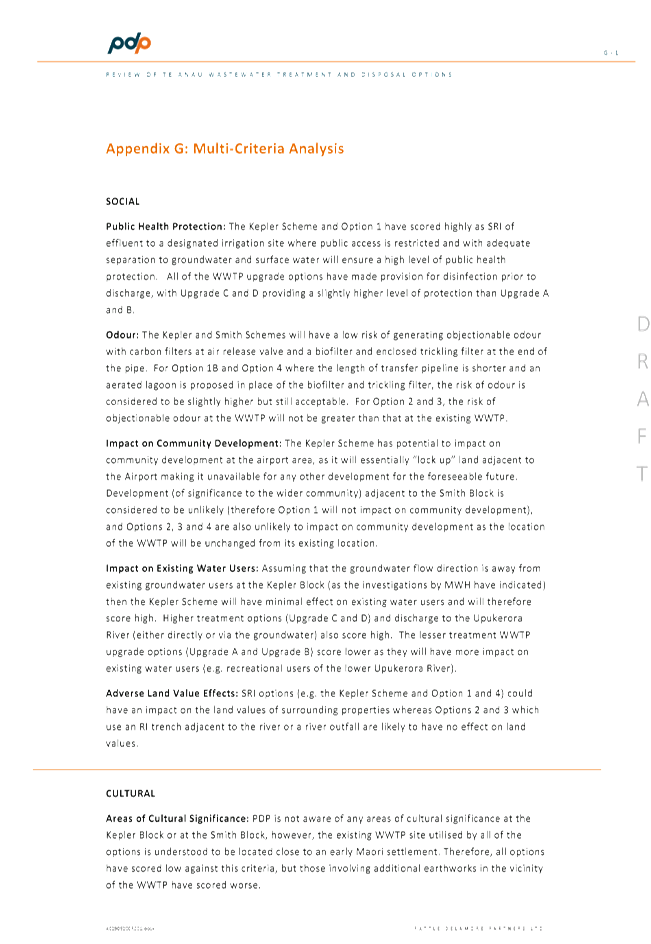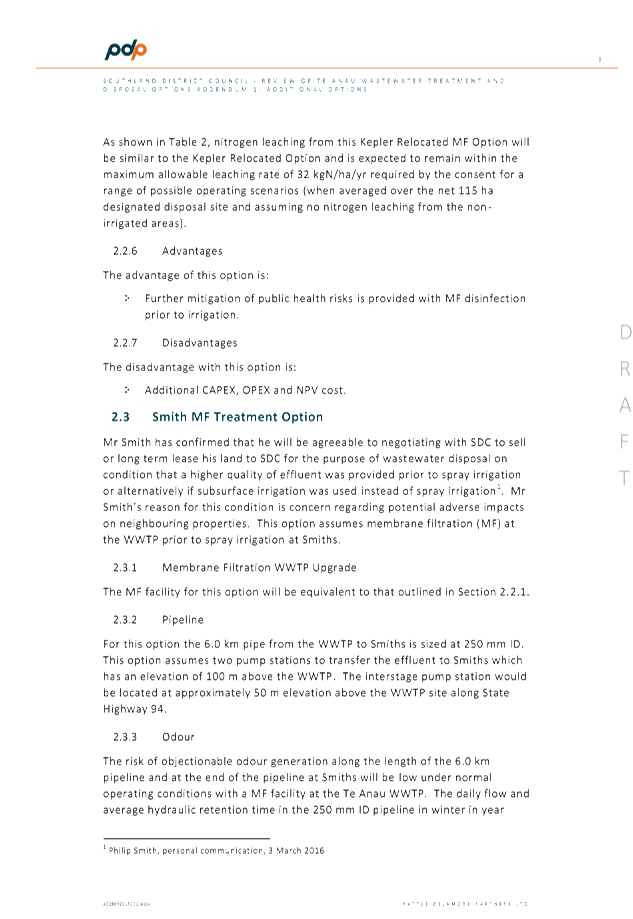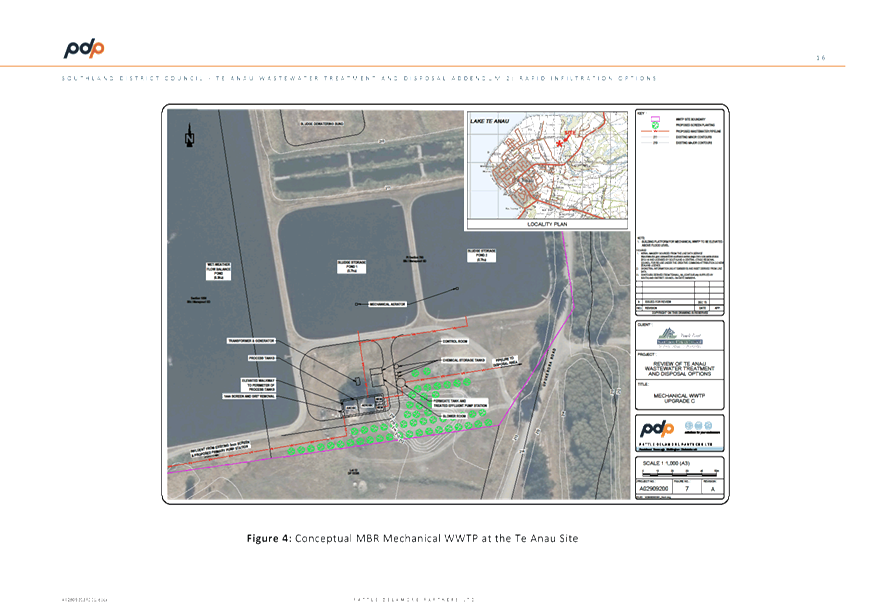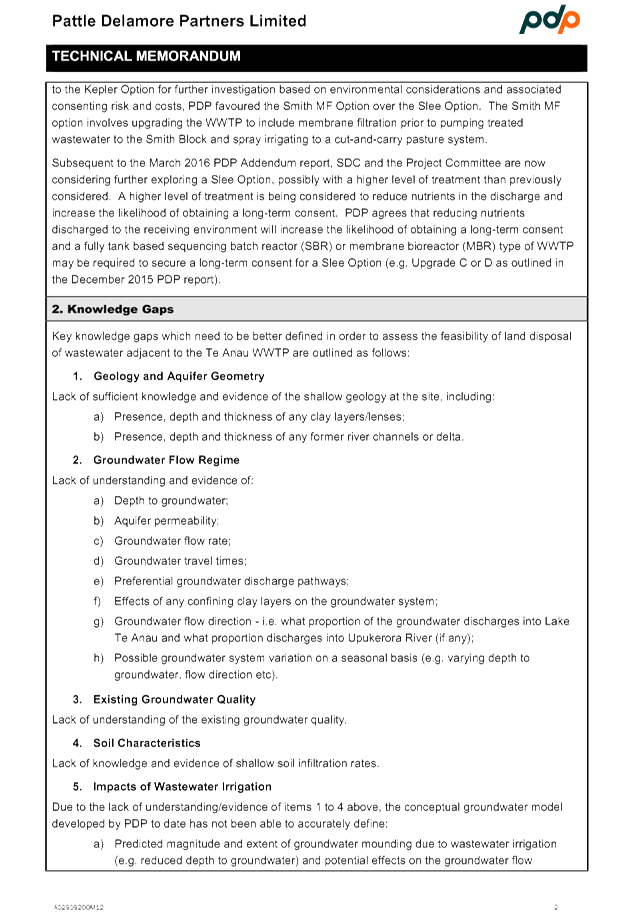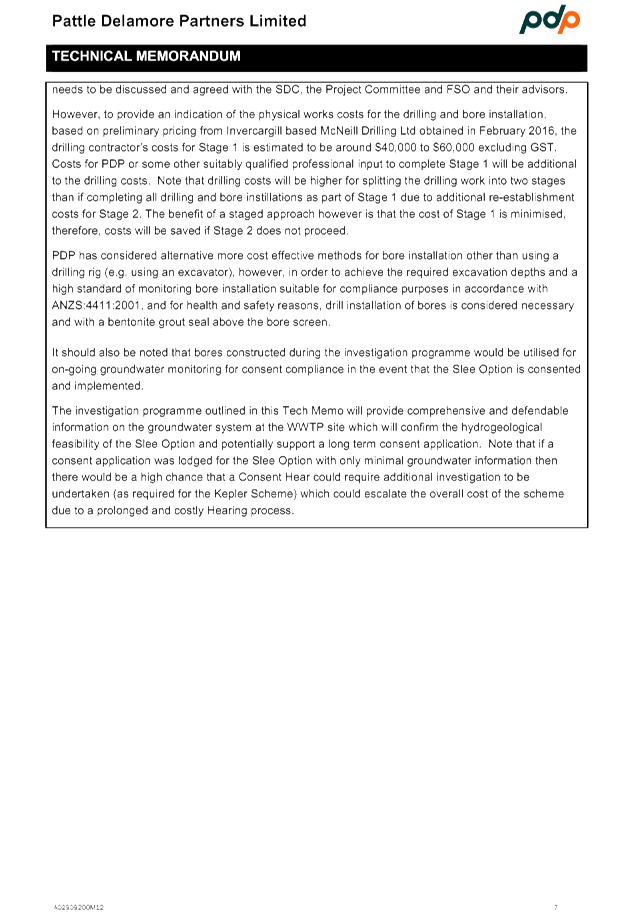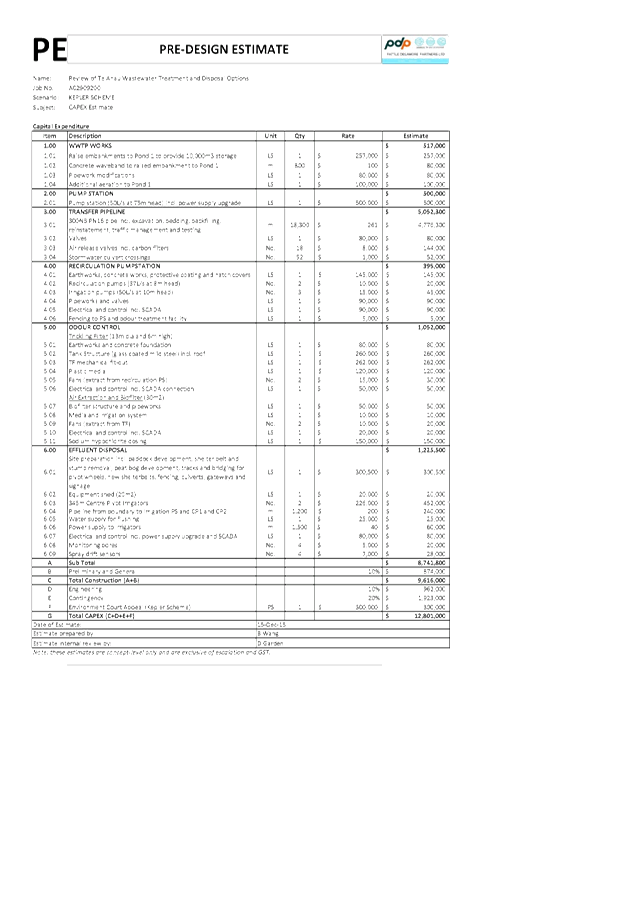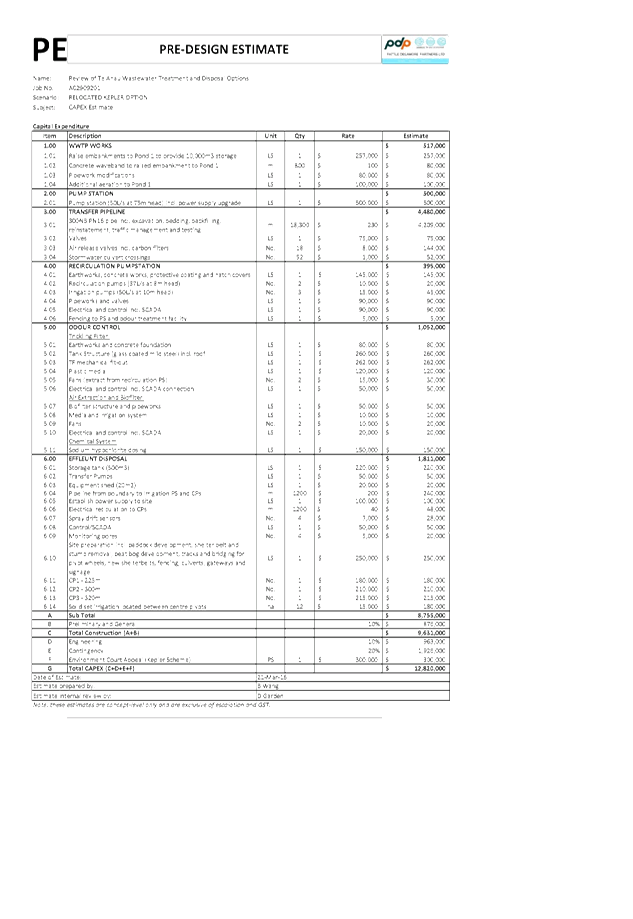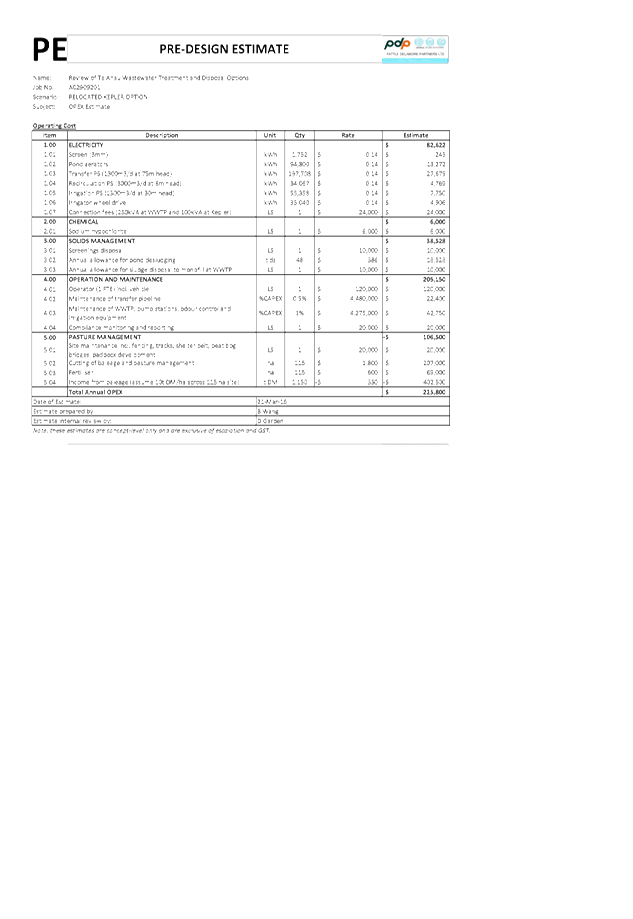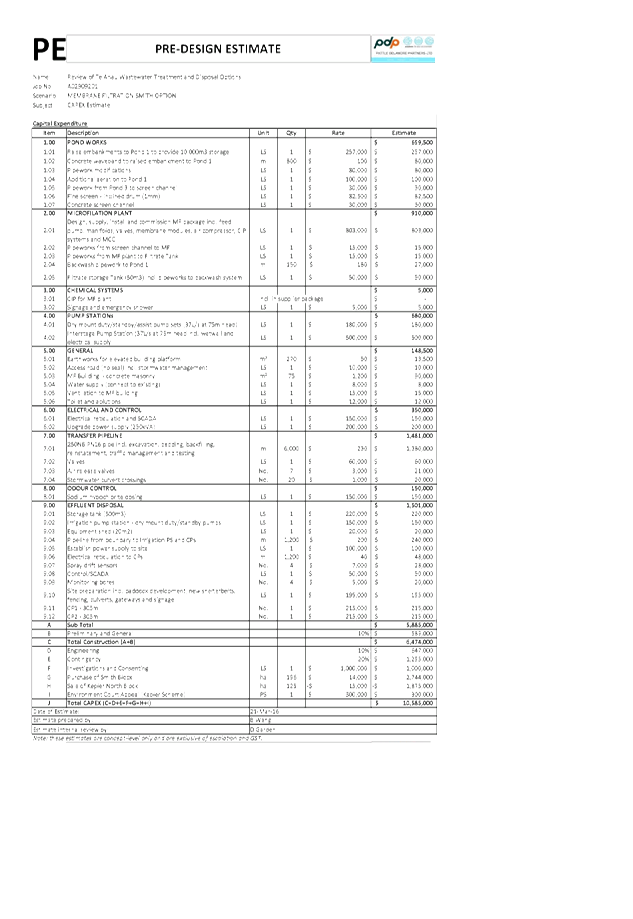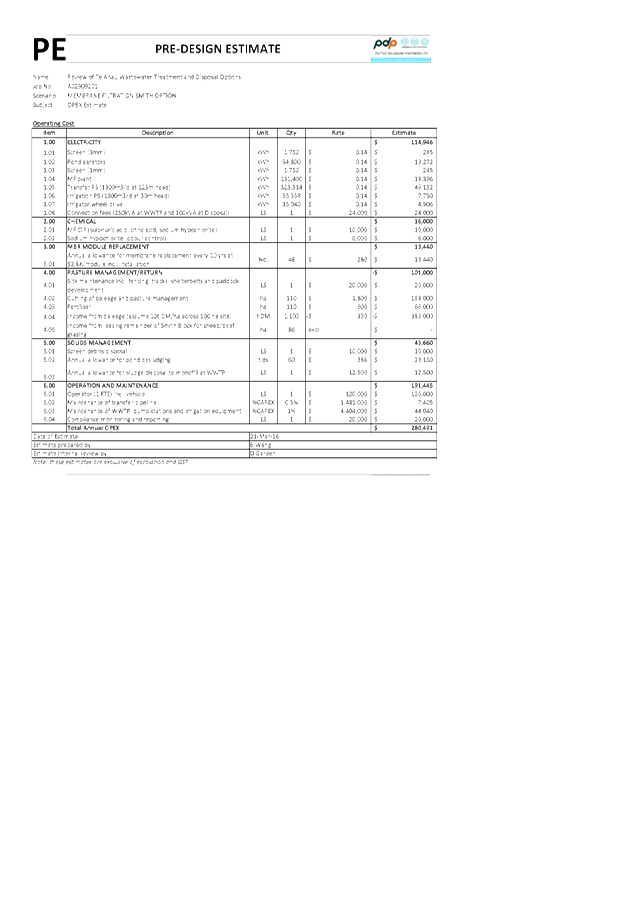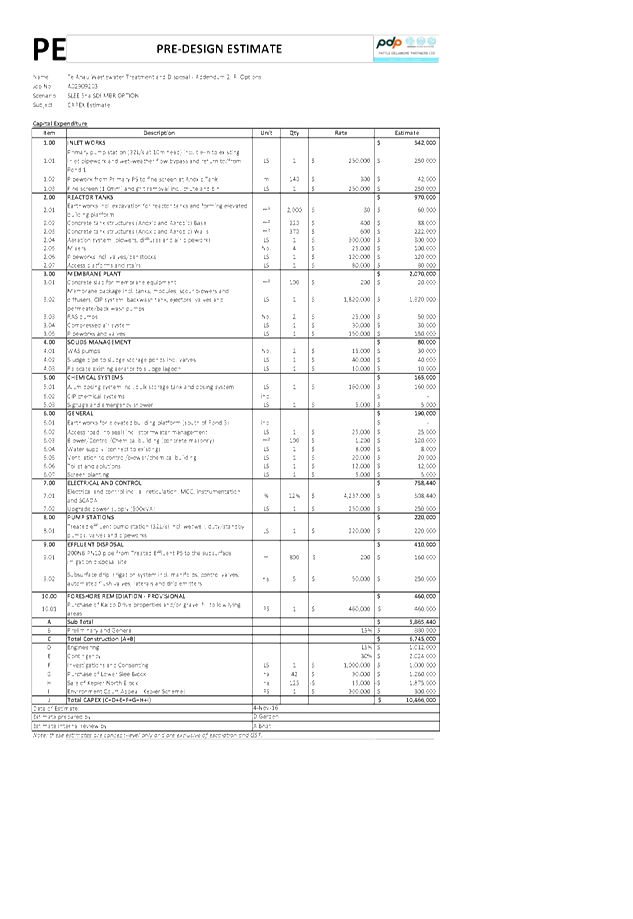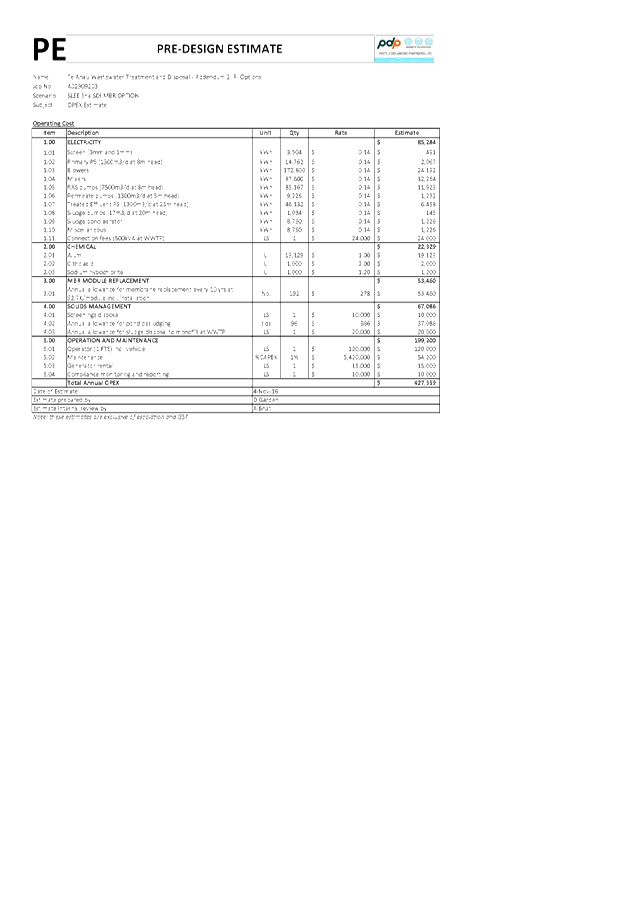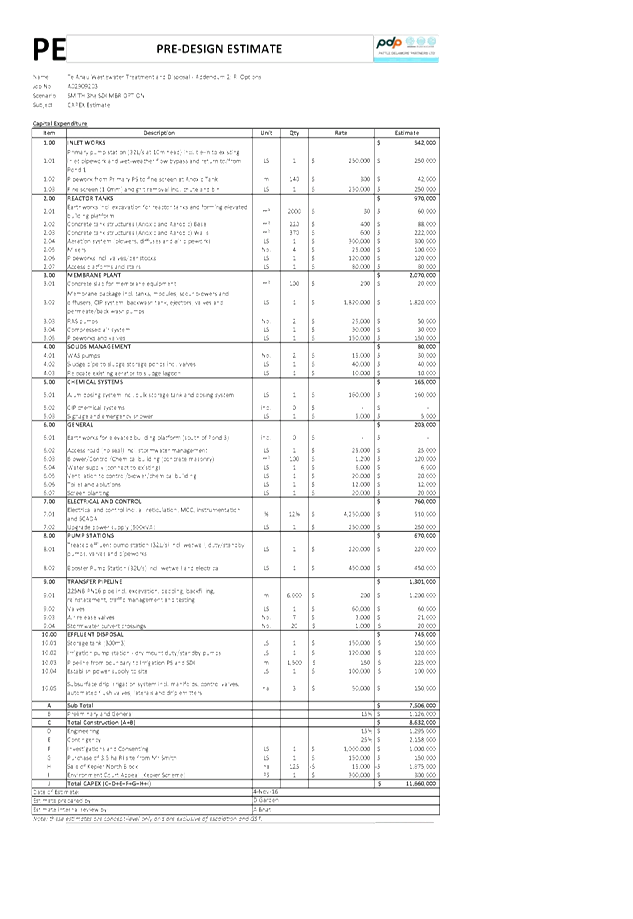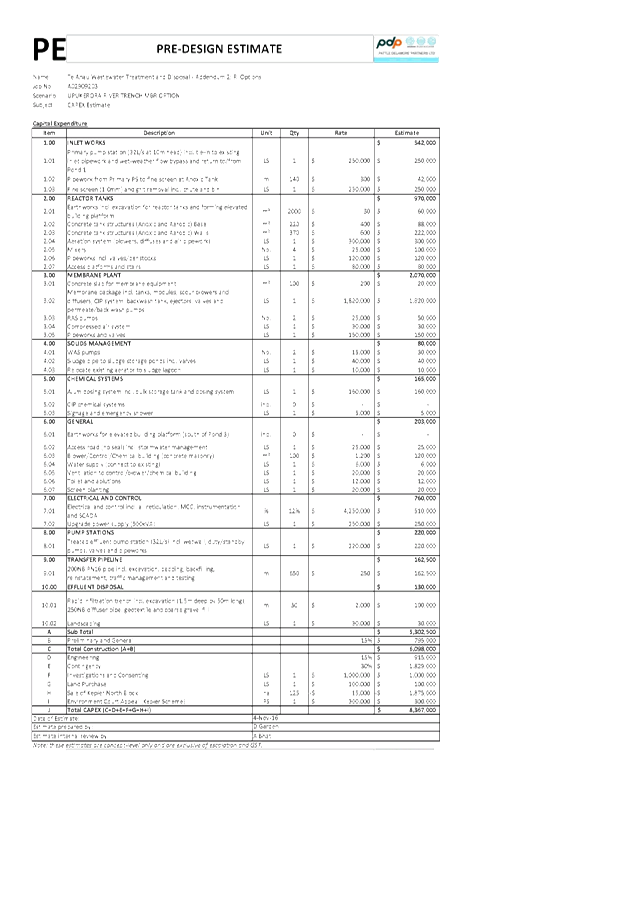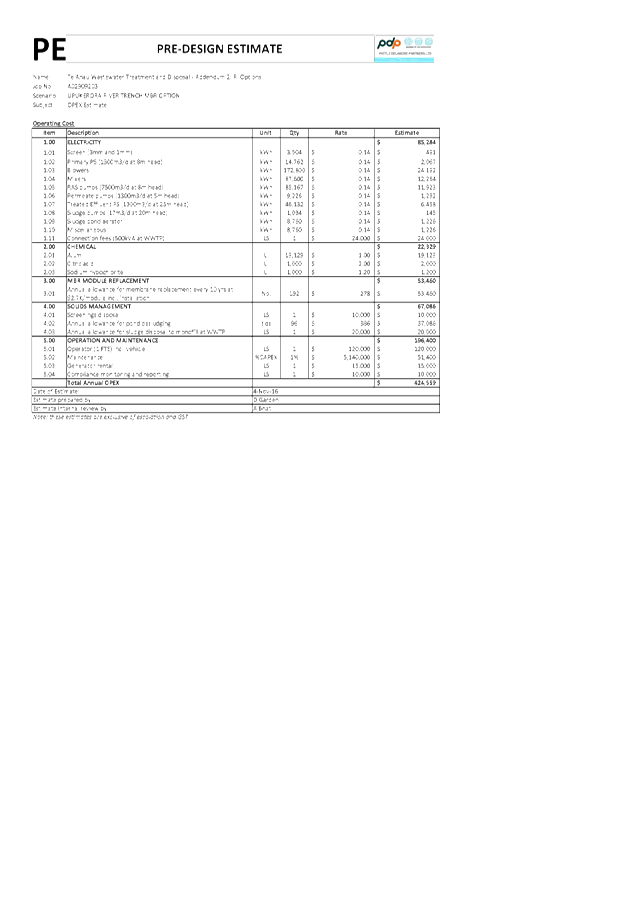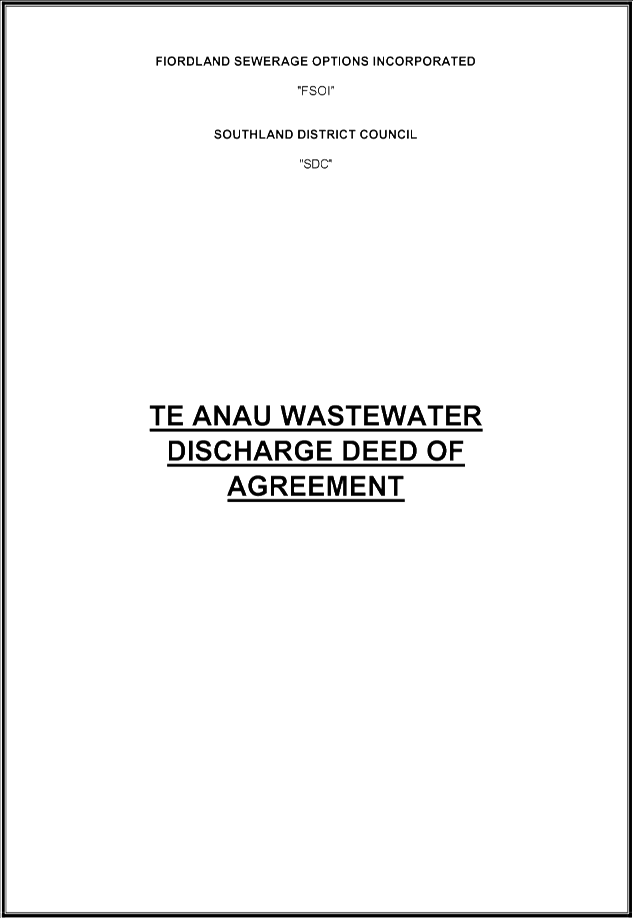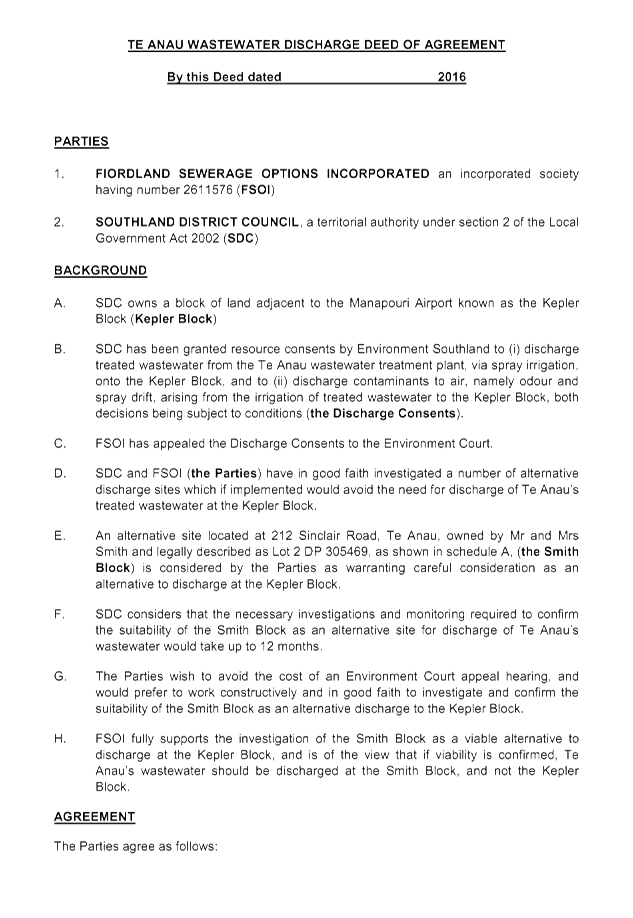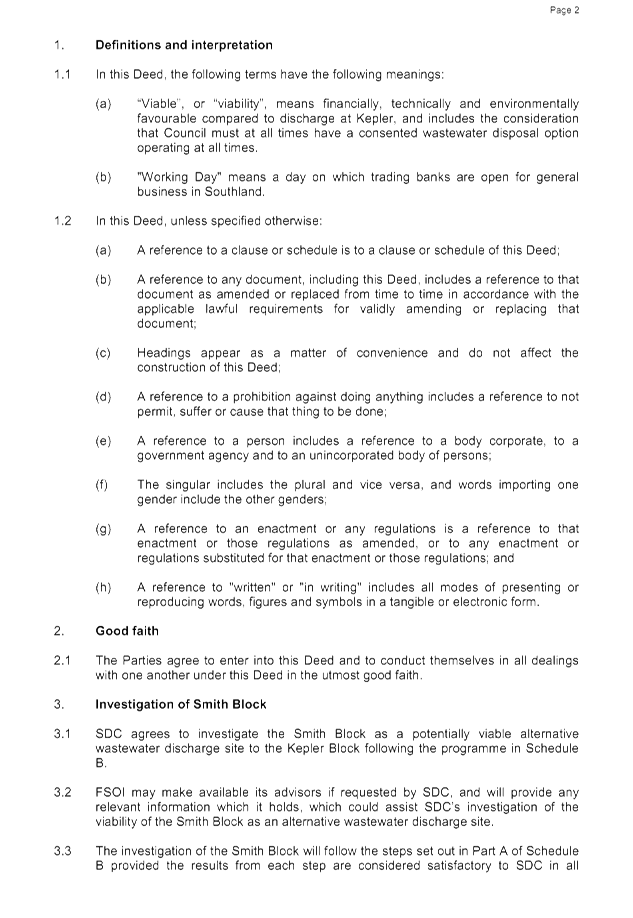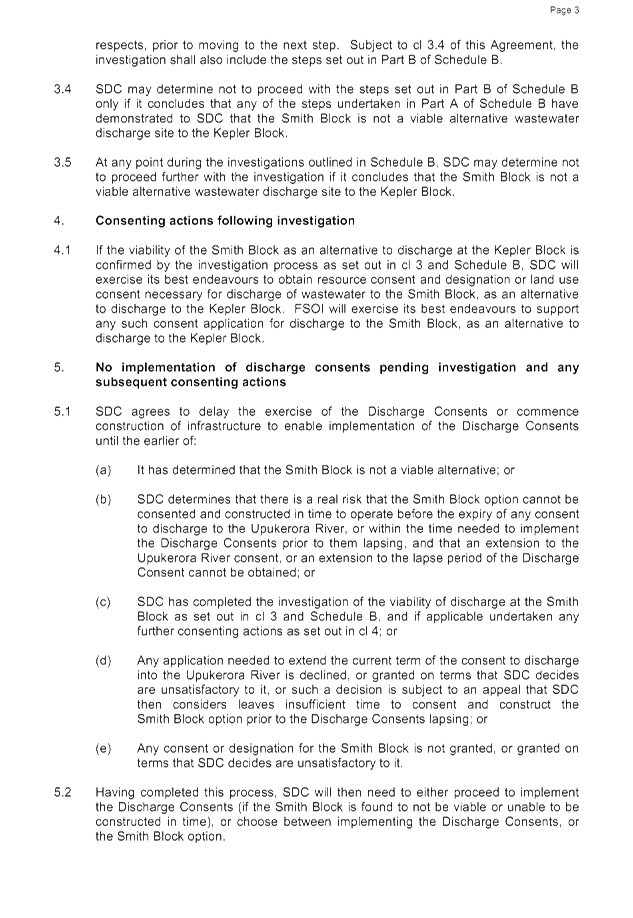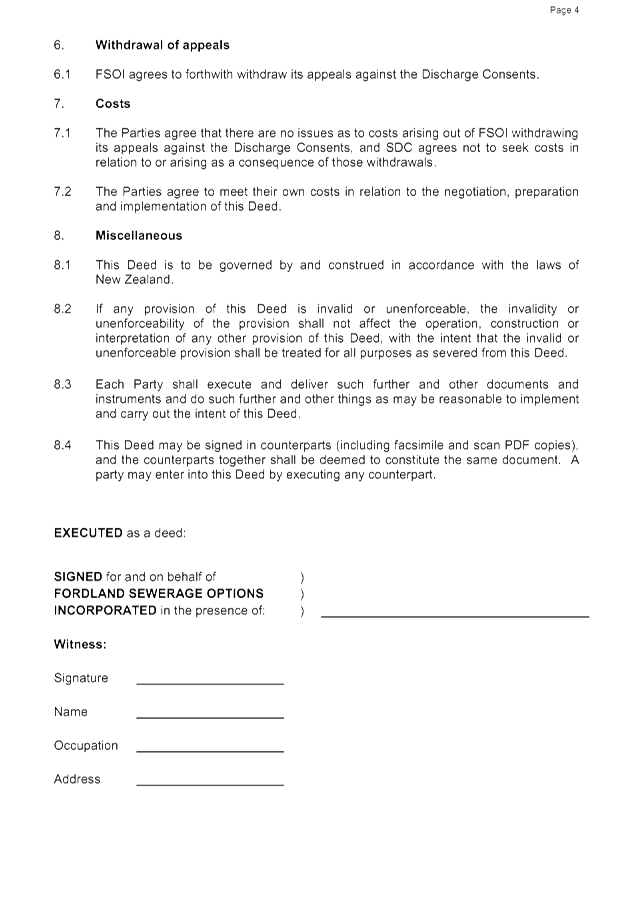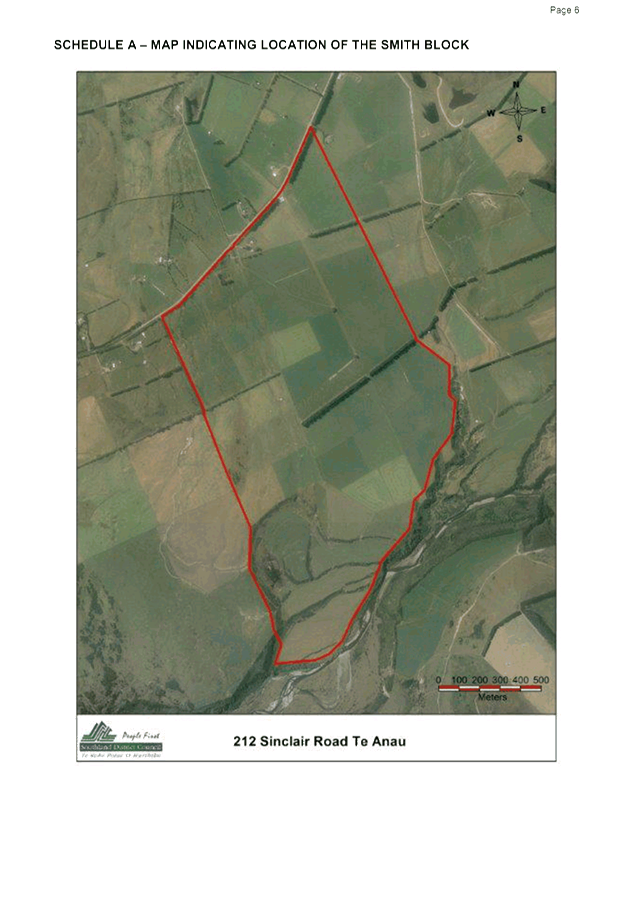|
Extraordinary Council
21 December
2016
|

|
Te Anau Wastewater - Deed of Agreement
Record No: R/16/12/20841
Author: Steve
Ruru, Chief Executive
Approved by: Steve Ruru,
Chief Executive
☒
Decision ☐
Recommendation ☐
Information
Purpose
1 To
enable Council to determine whether it should approve the Deed of Agreement
that has been negotiated with Fiordland Sewage Options Incorporated
(FSOI).
Executive
Summary
2 The
Council has been pursuing development of a new land based treatment and disposal
system for the Te Anau wastewater scheme for some time. In January 2015 a 25
year consent was granted to allow for the discharge of treated wastewater onto
land at the Kepler Block site via centre pivot irrigators. This consent
was appealed by FSOI. The appeal is currently set down to be heard by the
Environment Court in the May/June 2017.
3 A
Deed of Agreement has now been negotiated with FSOI. In summary the Deed of
Agreement provides for:
· Council
agreeing to proceed with investigation of the Smith Block to determine whether
it is a viable alternative when compared to the consented Kepler scheme.
· Council
determining at any stage during the investigations not to proceed further with
the investigation if it concludes that the Smith block is not a viable
alternative to the Kepler.
· Council
deciding at the end of the investigation and consenting programme whether to
proceed with either the Kepler or Smith options.
· FSOI
agreeing to withdraw their appeals against the Kepler consents with costs lying
where they fall.
4 A
decision to approve the agreement will lead to the need for Council to enter
into a land acquisition, investigation and consenting programme for the Smith
block. As a result Council would be committing to an extensive
investigation/consenting programme that can be expected to cost in excess of $1
million at a time when it already has a consented option at the Kepler Block.
It would also likely trigger the need to apply for an extension to the current
discharge to the Upukerora and the five year timeframe within which Council is
required to give effect to the Kepler consent. As a result a decision in
accordance with the recommendation is considered to be significant.
5 A
decision to approve the Deed of Agreement will also lead to a need to review
the role that the Te Anau Wastewater Discharge Project Committee needs to play
given that it has previously been charged with completing the peer review
process and making recommendations to Council as to how Council should manage
this project. In these circumstances it would be appropriate for the Council to
seek advice on how, if at all, it should amend the Terms of Reference for the
Project Committee.
|
Recommendation
That the Council:
a) Receives
the report titled “Te Anau Wastewater - Deed of Agreement” dated 19
December 2016.
b) Determines
that this matter or decision be recognised as significant in
terms of Section 76 of the Local Government Act 2002.
c) Determines
that it has complied with the decision-making provisions of the Local
Government Act 2002 to the extent necessary in relation to this decision; and
in accordance with Section 79 of the Act determines that it does not require
further information, further assessment of options or further analysis of
costs and benefits or advantages and disadvantages prior to making a decision
on this matter.
d) Determines
that it is unacceptable for the Council not to have a consented
discharge for the Te Anau Wastewater scheme and that as a result it will
continue to adopt a prudent approach to the evaluation and consideration of
alternative wastewater treatment and disposal options.
e) Approves
the Deed of Agreement that has been negotiated with Fiordland Sewage Options
Incorporated which provides for the Council to proceed with investigation of
the Smith Block option in return for Fiordland Sewage Options Incorporated
withdrawing their appeal against the resource consents which have been
granted for the Kepler scheme.
f) Delegate’s
authority to the Mayor and Chief Executive to finalise and execute the Deed
of Agreement with Fiordland Sewage Options Incorporated.
g) Agree
that in approving the Deed of Agreement notes that, at any stage during the
investigation process, the Council is able to determine not to continue with
the investigation/consenting process if it concludes that the Smith Block is
not a viable alternative when compared to the consented Kepler option.
h) Confirms
that the consented Kepler option remains its preferred option, at this point
in time, and although this position may be reviewed as investigation and
potentially consenting of the Smith Block option(s) proceed, it is
appropriate that the costs associated with the consented Kepler option
continue to be capitalised.
i) Determines
that the costs associated with investigating and consenting the Smith Block
will be funded as operational expenditure and notes that it will need to make
a decision as part of the 2017/18 Annual Plan as to how these costs are to be
funded.
j) Asks
officers to provide a scoping report on the process that would need to be
followed and the likely costs, timeframes and risks associated with seeking
another discharge consent for the current Upukerora discharge to go beyond
December 2020 and seek an extension to the date by which it would need to
give effect to the Kepler option.
k) Determines,
in light of its decision to approve the Deed of Agreement, that it hereby
revokes the following resolution which it passed at its 16 November 2016 meeting:
h) Notes that as part of a separate order paper item it
will be giving consideration to a proposal to reform a Te Anau Wastewater
Disposal Project Committee and that it would be appropriate for the PDP
report to be referred to that Committee for advice as to the one preferred
alternative Wastewater Treatment and Disposal option that the Committee would
recommend Council give further consideration to pursuing by the end of March
2017.
l) Asks
officers to report back to Council at its 1 February 2017 Council meeting on
changes which should be made to the Te Anau Wastewater Discharge Project
Committee Terms of Reference in light of the decisions made in this report
including the decision to approve the Deed of Agreement with Fiordland Sewage
Options Incorporated.
|
Content
Background
6 The
Council has been pursing development of a new land based treatment and disposal
system for the Te Anau wastewater scheme for some time.
7 A
25 year consent was granted on 22 January 2015 to allow for the discharge of
treated wastewater onto land at the Kepler Block site via centre pivot
irrigators. This consent was appealed to the Environment Court by
Fiordland Sewage Options Incorporated (FSOI) and two other appellants, who have
subsequently withdrawn their appeals. The FSOI appeal remains.
8 One
of the fundamental objectives of the overall strategy, in regards to wastewater
disposal, is to secure not only as long a term as possible for a consented
option (certainly not any less than 25 years) but also to have the confidence
that Council will have the ability to renew the consent at the end of that
period. Given the significant capital costs associated with development of any
new disposal system it is important that Council have confidence that the
option chosen will be able to obtain a new consent at the end of an initial
long term consent period.
9 Following
the appeal to the Kepler consent Council engaged Pattle Delamore Partners Ltd
("PDP") to complete a peer review of the consented option and report
on its viability. As part of that process PDP were also asked to compare
the Kepler option with any identified reasonably practicable alternatives.
10 At
a high level the PDP review identified that the Kepler scheme contained no
fundamental flaws. The review also identified a number of alternatives that may
be worthy of further investigation should Council wish to consider alternatives.
These alternatives were largely based around discussions with representatives
of FSOI and included the Smith Block.
11 The
PDP report identified its preferred disposal option on the Smith Block as being
based on improved treatment at the oxidation pond site by membrane filtration
followed by land disposal via centre pivot spray irrigation as proposed at the
Kepler. This proposal was based on centre pivot irrigation being a more cost
effective alternative when compared with other alternatives.
12 At
its meeting of 6 July 2016, the Te Anau Wastewater Project Committee asked that
an option(s) based around advanced treatment either by membrane bioreactor
(MBR) or sequential batch reactor (SBR) with disposal via rapid infiltration to
land around the oxidation pond site, or the Smith block be developed. Attached
(Appendix D) is the investigation programme scoping report prepared by PDP in
response to this request. This report highlighted the need for a significant
upgrade to the current treatment plant technology to achieve disposal via rapid
infiltration and that this option was not viable, from an economic perspective,
at the Smith Block.
13 A
report outlining the findings from the latest PDP work was presented to Council
at its 16 November meeting. At that time Council agreed that if it were to
investigate an alternative, then the Te Anau Wastewater Discharge Project
Committee should be required to put forward a single option for
consideration by Council. The Project Committee are due to meet on 17 February
to formally consider the Council’s request. The Committee were, however,
briefed on the alternatives at a workshop meeting on Tuesday 13 December.
14 Councillors
were given the opportunity, as part of the Council tour on 17 and 18 November
2016 to visit both the Smith and Slee Blocks along with the existing Te Anau
Wastewater Treatment Plant.
15 In
late November FSOI approached Council seeking to negotiate a Deed of Agreement.
The outcome from these negotiations is reflected in the Deed attached.
16 In
summary the Deed of Agreement provides for:
· Council
agreeing to proceed with investigation of the Smith Block to determine whether
it is a viable alternative to the consented Kepler scheme. Viability is defined
in the agreement as meaning that the Smith alternative must be “…financially,
technically and environmentally favourable compared to discharge at Kepler, and
includes the consideration that Council must at all times have a consented
wastewater disposal option.”
· Council
determining at any stage during the investigations not to proceed further with
the investigation if it concludes that the Smith block is not a viable
alternative to the Kepler.
· Council
deciding at the end of the investigation and consenting programme whether to
proceed with either the Kepler or Smith options.
· FSOI
agreeing to withdraw their appeals against the Kepler consents with costs lying
where they fall.
Issues
17 There
is a need for the Council to decide whether it wishes to approve the Deed of
Agreement that has been negotiated with FSOI.
18 A
decision to approve the Agreement will lead to the need for Council to enter
into a land acquisition, investigation and consenting programme for the Smith
block. While the Council has reserved the right to cease the investigation
programme should it not prove viable a decision to approve the agreement will
commit the Council to an extensive investigation/consenting programme that can
be expected to cost in excess of $1 million. It will also likely trigger the
need to apply for an extension to the current discharge to the Upukerora and a
request to amend the timeframe within which Council is required to give effect
to the Kepler consent.
19 The
Agreement will also lead to a change in the role that the Te Anau Wastewater
Discharge Project Committee needs to play given that it has previously been
charged with completing the peer review process and making recommendations to
Council as to the option(s) that it should pursue. In addition the Council will
also have a number of contractual obligations which will need to be observed
and monitored in an appropriate manner. In these circumstances it would be
appropriate for the Council to seek advice on how, if at all, it should amend
the Terms of Reference for the Project Committee.
Factors to Consider
Legal
and Statutory Requirements
20 All
decisions of the Council are subject to the decision-making provisions detailed
in Part 6 of the Local Government Act 2002. Officers are of the view that a
decision to approve the Deed of Agreement would constitute a significant
decision. As such there is a need for Council to ensure that it has complied
with the decision-making provisions in the Act to an extent that reflects the
significance of the decision being made.
21 Under
the Resource Management Act 1991, the Kepler Block disposal site has been
granted all necessary resource consents and designated for treated wastewater
disposal by a panel of independent Commissioners. These consents would
become operative following the withdrawal of the FSOI appeal. As a result there
would be a need for the Council to give effect to the consents (ie begin the
discharge of wastewater at the Kepler site) within five years of the date on
which the appeals are withdrawn.
22 If
the Smith Block investigations show that this site is viable there would be a
need for the Council to seek resource consents from Environment Southland and a
land use designation for the required area. The consent applications would be
assessed against current regional and district plan provisions.
23 Counsel
has previously advised that, in evaluating any alternative, it is important to
remember that the alternative, in this case the Smith Block, must demonstrate
the same level of minimal environmental effect as demonstrated through the
consent for the Kepler proposal. This is why it is appropriate that the
viability of the Smith Block is defined as being whether it is comparable to
the Kepler option.
24 Counsel
has also previously advised that Council should not surrender the Kepler
consents, until it has in place, and beyond challenge, the consents needed for
an alternative scheme. It is important that Council look to ensure it has a
consented discharge option available at all times. This is of particular
relevance given that consent for the current discharge to the Upukerora Stream
expires in December 2020.
Community
Views
25 Under
Section 78 of the Local Government Act 2002, the Council is required to
consider the range of community views that might exist in making any decisions.
Section 78(3) makes it clear that this requirement does not create an
obligation to undertake community consultation.
26 The
actions taken by FSOI to submit against, subsequently appeal the Kepler
consents and actively look for an alternative site are evidence that there are
a number within the Te Anau and Manapouri communities who are concerned about
the Kepler option and believe that there may be a more favourable
alternative. The views held by these people would support a Council
decision to approve the Deed of Agreement.
27 Given
that the wastewater activity is treated as a district wide activity, and funded
accordingly it is appropriate, however, that the Council also consider the
views of other wastewater users and district wide ratepayers, in general. They
will be required to fund the costs and risks associated with investigation of
the Smith Block option when they have also been required to fund the costs
associated with developing the Kepler option.
28 It
is reasonable to expect that, in addition to appropriately addressing the
environmental impacts of any proposal, there will be ratepayers who also expect
the Council to manage the financial aspects of the project in a prudent and
cautious way. Hence, the Council should not, for example, write off the
historical investment that has been made in getting to the current point
without good reason and should be conscious of the financial costs and risks
associated with pursuing the land acquisition, investigation and consenting
programme proposed for the Smith Block. If the Council is not satisfied that the
Smith Block presents an option that is potentially more favourable than the
Kepler then it should not approve the Deed of Agreement.
29 It
is also important to note that in seeking to develop an alternative disposal
option at the Smith Block there is a risk that any consent application that
Council might make could be challenged by an affected party. This is one of the
reasons as to why, one of the steps included in Schedule B of the Deed of
Agreement, is for the Council to consult with a range of likely affected
parties at an early stage in the investigation process.
30 Council
also needs to be aware of the risk that a number of stakeholders may not be
supportive of a further extension of time to a continuation of discharge to the
Upukerora and/or an extension of the timeframe within which Council has to give
effect to the Kepler consent. This may add additional time and cost to the
application with no guarantee of a successful outcome.
31 A
further view to be considered is that of Ngāi Tahu and local iwi.
Ngāi Tahu (through
Te Ao Mārama Incorporated) has been a key stakeholder in the development
of the overall Te Anau Wastewater Strategy initially through involvement with
the original Infrastructure Working Party and more recently through membership
of the Te Anau Wastewater Project Committee.
32 Throughout
the development of the overall wastewater strategy, Ngāi Tahu have been
consistent in their message that direct discharges to water are unacceptable
and should not be considered. This view has been a factor in the decision to
pursue the Kepler option as well as recent potential alternatives that have
been developed.
33 At
the Discharge Project Committee of 6 July 2016, Committee Member Mowat provided
an outline of the Ngāi Tahu perspective on wastewater treatment and
disposal.
34 In
general terms the discharge of wastewater to waterways irrespective of the
level of treatment provided is considered unacceptable to Iwi and should be
avoided. Of equal importance is the nature of land form and the permeability
of soil structure and hence the length of time the discharge will take to reach
the receiving environment. There will be a need for formal engagement
with Iwi about the relative merits of the Smith Block.
35 The
Kepler proposal has been identified as Council’s preferred option in
previous Long Term Plans and therefore has been subject to community
consultation via the consultation process followed in developing these
documents. Council will have considered the range of views expressed in adopting
the Kepler option.
Costs
and Funding
36 Since
July 2013, approximately $1.3M has been spent through the investigation and
consenting stages of the project on the Kepler option. These costs are
currently being treated as a capital expense as they are seen as being part of
the implementation of the Council’s current preferred option. The costs
incurred to date would need to be ‘written off’ should the Council
make a decision that the Kepler was no longer its preferred option.
37 Against
this background the costs associated with investigation of the Smith Block will
need to be treated as an operational expense and funded accordingly.
Operational expenditure is normally funded directly from the activities
operating income for the year. This is ensure Council maintains a
balanced budget as required under section 100 of the Local Government Act
2002. The majority of income for the District Wastewater activity is from
rates.
38 At
this stage the steps involved with and likely costs associated with negotiation
of a land acquisition agreement, investigation and consenting of a Smith Block
disposal system option have not been fully scoped and costed. This work has
been commissioned but will not be available by the time of the Council meeting
at which this report needs to be considered. As a result there will be a need
for the Council to determine whether it is prepared to proceed with approving
the attached Deed of Agreement and committing to beginning an investigation of
the Smith Block in the absence of such information.
39 PDP
have, however, completed a high level NPV analysis of a number of options which
could be developed at the Smith Block and compared these to the Kepler option.
The basis for these exercises is detailed in the attached PDP reports. The cost
estimates developed through these exercises is summarised in the following
table:
|
Option
|
Capex
($M)
|
Opex
($000)
|
25
Year NPV
($M)
|
|
Kepler Centre Pivot
(consented)
|
$12.8
|
$220
|
$15.9
|
|
Kepler Relocated Centre Pivot
|
$12.8
|
$230
|
$16.1
|
|
Smith Centre Pivot
|
$10.6
|
$280
|
$14.5
|
|
Smith IDEAL SDI
|
$14.2
|
$340
|
$19.0
|
|
Smith MBR 3ha SDI (RI)
|
$11.7
|
$470
|
$18.4
|
40 The
capital expenditure estimates developed by PDP include an allowance of $1
million for investigation/consenting of the Smith Block. They also assume that
the Smith can be acquired for $2.75 million with this cost being offset by a
partial sale of the Kepler block for $1.9 million.
41 In
looking at the summary of the cost estimates prepared by PDP it is important to
remember that they do not include an allowance for seeking an extension of the
current Upukerora discharge consent or an extension of the timeframe within
which Council needs to give effect to the Kepler consent. Given the likelihood
of these consents needing to go through a full public notification and hearing
process it is likely that the costs associated with this process will exceed
$200,000.
42 Officers
will include in the draft Annual Plan for 2017/18, which will be formally
considered by Council at its 1 February 2017 meeting, an allowance of $500K
operating costs for the investigations into the Smith Block.
43 As
mentioned above operational costs are usually funded in the year that the cost
is incurred. If the $500K is funded entirely in the 2017/18 it would cost
$53.18 (GST exclusive) per connection. Due to the amount of this increase
it is proposed to fund this expenditure through a 5 year short term loan.
A five year loan will add $12.30 (GST exclusive) per connection for 2018/19 to
2022/23. It can be expected that a similar level of operational expenditure
would also need to be funded in the 2018/19 financial year. In making a
decision to confirm the funding of the Smith Block investigation programme in
the manner proposed the Council will also need to determine, in accordance with
the provisions of section 100, that it is financially prudent to not operate a
balanced budget.
44 In
making a decision on whether to approve the Deed of Agreement and investigate
the Smith Block, the Council needs to be satisfied that the advantages and
disadvantages (including risks) of pursuing the Smith Block outweigh those
associated with pursuing the Kepler option. While the work completed by PDP
shows a slightly more favourable NPV for an option based on centre pivot
irrigation at the Kepler there is not a significant difference and the NPV for
an IDEAL/SDI option exceeds that for the Kepler. Officers understand that the
use of centre pivot irrigation at the Smith block would not be supported by
FSOI.
45 While
the Net Present Value assessment included in the draft PDP report contains some
level of assessment, it has not been subjected to a comprehensive financial
analysis and risk assessment process. If the Council were to make a
decision to approve the Deed of Settlement at this stage, in the absence of
such an analysis it would be appropriate for this work to be undertaken as the
investigations of the Smith Block proceeds. Given that the Deed allows for the
Council to cease the investigations if it concludes at any point that the Smith
Block is not viable relative to the Kepler option there is the ability for the
Council to cease the investigation programme if it has a reasonable basis upon
which to conclude that the Smith Block is not viable.
46 The
financial implications to be taken into consideration in the more detailed
analysis will include but not be limited to:
· Capital
and operational expenditure projections and the net present value of the
cashflows associated with each of the alternatives.
· Sale/purchase
of land considerations - including agreements to cover investigations on
private land and repayment of any outstanding loans.
· Projected
income (and risks) associated with the cut and carry operations from the Smith
Block and how these might compare to projections from the consented Kepler
site. Note that with the Kepler site Council has an agreement with Landcorp to
purchase the baleage.
· The
write-off of costs incurred in developing the Kepler and Smith Block options
including re-consenting the current discharge to the Upukerora.
· An
assessment of the risks associated with each option.
Policy
Implications
47 Any
new consent application for the Smith Block, or extension of the current
Upukerora consent, will need to be assessed against the latest planning
provisions in the regional and district plans. Environment Southland have
recently notified the Water and Land Plan which is 2020 process.
48 The
preference for wastewater to be discharged to land rather than water is a
well-known concept within the region. It arises in the operative Regional
Policy Statement (RPS) in Policy 5.4, and is duplicated in the proposed RPS at
Policy WQUAL.7. In both the operative and proposed RPS, the preference is
to be used when discharge to land is practicable, and when the adverse effects
are not significant.
49 Council
has shown that it is practicable to discharge to land in the Kepler Block
scheme, and in its decision to grant resource consent, the Commissioners stated
that the proposal would be well within the significant adverse effect threshold
under the operative RPS. The key environmental outcome of the proposal is
that the discharge is to land, and not to the Upukerora River, which better
meets stakeholder expectations and environmental preferences, as identified in
both the RPS mentioned above, as well as in the NPS.
Any alternative option would also need to meet these criteria.
50 The
District Plan provisions will also apply to any new consent application with
that alternative requiring either a land use consent or a designation as is
currently in place at Kepler. This would likely require notification and
a hearing.
51 The
decision on the notification path (ie non/limited/publically notified) will
depend on the likely level of effects and whether they extend beyond the
broadly adjoining properties.
Setbacks outlined in the current and proposed plan will apply around the
designation which could further restrict site selection and available land for
future expansion, with it being unlikely that these could be reduced by way of
consent conditions.
Upukerora Discharge Consent
52 Informal
indications from Environment Southland are that any consent for extending the
term of discharge to the Upukerora will have to be assessed as a new consent,
under both the current and proposed plans and that the application would likely
be publicly notified and assessed at a hearing by independent commissioners.
This is likely to add significant time and cost onto the project which would
need to be budgeted for as a separate project cost. It is also important to
remember that through the application and submissions process there is the risk
of parties objecting to and potentially appealing any decision.
53 Obviously,
if Council wished to pursue investigation of the Smith Block then it will need
confidence that it will be able to secure a further extension. It is estimated
that it could take up to twelve months to undertake a new Upukerora consenting
process up to the stage where a decision is released and free from appeal.
Risk Assessment
54 The
key risks around the consented proposal are documented and well understood.
Less well understood are the risks associated with pursuing investigation and
consenting of a disposal option at the Smith Block. At a broad level
these will likely include the following:
· Being
unable to secure sufficient suitable land for long term treatment/disposal of
Te Anau wastewater. By long term it is meant beyond the life of the 25
year consent.
· Risk
of securing a long term consent (at least 25 years as this is what has been
granted at Kepler), and having the confidence that future consents could also
be secured.
· Risk
of appeal of any alternative consent.
· Not
securing a further short term discharge consent to the Upukerora (or risk of
any consent being appealed) and/or not being able to secure an extension to the
period within which Council needs to give effect to the Kepler consent.
· Loss
of support from key stakeholders and affected parties.
55 Obviously,
there are mitigation strategies that could be implemented to manage each of
these but overall these are all significant risks that Council needs to be
aware of when making a decision as to whether it should enter into the Deed of
Agreement.
56 If
Council does decide to enter into the Deed of Agreement with FSOI it will also
face a risk of future decisions it makes in relation to pursuit of the Smith
Block or Kepler option being challenged by FSOI. This compares with the risk of
proceeding to an appeal in relation to the consented Kepler option. The latter
will be heard and decided, subject to the decision of the Environment Court not
being appealed, during 2017. The Deed of Agreement will create a contractual
relationship between Council and FSOI until the Smith Block investigation
programme is complete.
Project Timelines
57 A
report detailing the high level timelines and critical dates that need to be
factored into the decision making process was considered by Council at its 16
November meeting.
58 The
first key date indicated in this timeline was December 2020 when the current
discharge consent to the Upukerora River expires. The other critical date,
assuming that Council approves the Deed, will be December 2021 which is the
date by which Council will need to give effect to the Kepler consent if it is
to pursue that option.
59 The
timelines included in the report indicated that of the four scenarios
considered, the only one that has a reasonable prospect of meeting this
deadline is the current Kepler proposal. This means that it is inevitable
that if Council approves the Deed of Agreement then it will need to seek a new
resource consent for continuation of the Upukerora consent and extension of the
date by which it needs to give effect to the Kepler consent.
60 As
indicated above informal indications from Environment Southland are that any
new consent application seeking a longer timeframe for discharge to the
Upukerora will likely need to be publicly notified and assessed at a hearing by
independent commissioners. It would also need to be assessed under the
Regional Plans, including the new Land and Water Plan provisions, applying at
the date of application.
61 It
is estimated that it could take upto 12 months to undertake the consenting process
for an extension of the current Upukerora discharge up to the stage where a
decision is released and free from appeal. This timeframe may be able to
be shortened if there is a strong level of support from affected parties.
62 The
Deed of Agreement that has been negotiated with FSOI reflects the likely need
to seek an extension of the Upukerora consent and gives the Council the ability
to not proceed further should such an application not be successful.
Analysis
Options Considered
63 There
are three options identified. These are to approve the Deed of Agreement
that has been negotiated with FSOI (Option 1), Do Nothing (Option 2) and seek
amendments to the Deed of Agreement with FSOI (Option 3).
64 Under
Option 1 the Council would commit to investigating the Smith Block to determine
whether it represents a viable alternative to the Kepler option. In return for
this commitment FSOI would withdraw their appeal against the Kepler consents.
65 Under
Option 2 the Council would not approve the agreement meaning that FSOI would
likely continue with its appeals against the Kepler consents. Council would
wait for a recommendation back, following on from the decisions that Council
made at its 16 November meeting, from the Te Anau Wastewater Project Committee
as to its preferred option and the make a decision as to whether it wished.
Note that the Committee is scheduled to meet on 17 February 2017 to consider
the recommendation that it should make.
66
Under Option 3 the Council would seek to negotiate any amendments to the Deed
of Agreement that Councillors might consider desirable.
Analysis of Options
Option
1 – Approve Deed of Agreement
|
Advantages
|
Disadvantages
|
|
· FSOI
would withdraw appeals against Kepler consent.
· Smith
Block may prove to be a better alternative to the Kepler scheme.
· The
Deed of Agreement has a level of flexibility in that it allows the Council to
cease investigations should it reasonably determine that the Smith Block if
not viable as compared to the Kepler Scheme.
· Investigation
of the Smith Block would reflect concerns held by those who are opposed to
the consented Kepler option.
|
· Council
would be making a commitment to investigate the Smith Block ahead of a
recommendation from the Te Anau Wastewater Project Committee.
· Decision
would need to be made based on the information that Council currently has
available.
· Would
lead to increased investigation and consenting costs being incurred at a time
when the Council already has a consented option that reflects a decision
reached by Council over a number of years.
· The
investigation and consenting costs associated with the Smith Block will need
to be treated as an operational expense.
|
Option
2 – Do Nothing
|
Advantages
|
Disadvantages
|
|
· Council
would have a more comprehensive analysis of the costs, benefits and risks
associated with investigating an alternative to the Kepler consent once the
Project Committee has completed its work to identify a preferred alternative
for potential investigation by Council.
· Is
consistent with the Kepler scheme being the Council’s preferred option
which it has been pursuing for a number of years.
· Avoids
the costs associated with investigating the Smith Block.
|
· FSOI
likely to continue with their appeal against the Kepler consents which may
lead to the consents being declined.
|
Option
3 – Seek Amendments to the Deed of Agreement
|
Advantages
|
Disadvantages
|
|
· Would
allow Council to seek any further changes that it may consider appropriate.
These would presumably give greater flexibility to the Council.
· Other
advantages and disadvantages would remain as for Option 1.
|
· FSOI
may not be open to accepting any amendments that the Council may wish to seek
to negotiate.
|
Assessment of Significance
67 If
the Council were to approve the Deed of Agreement it would be committing to
unbudgeted operational expenditure, currently estimated to be in the order of
$1 million to investigate the Smith Block. Council would avoid the costs
associated with defending the FSOI appeals against the Kepler consent which had
previously been estimated as being in the order of $300,000. Council has not
explicitly consulted on this option but it has received a range of views from
FSOI on the merits of such an option.
68 Any
decision to abandon the current Kepler consented option would require the write
off of the expenditure incurred by Council to date. This includes some
$1.3M of expenditure currently held on the balance sheet for investigations
since 2013. This expenditure would need to be written off and funded from
operating revenue (ie rates). In addition, the Council would effectively
be writing off the investment in the work completed prior to 2010 that has
previously been funded.
69 Given
the level of expenditure involved and the importance of the decisions that
Council is being asked to make officers are of the view that the decisions
under consideration in this order paper are significant.
70 Officers
are also of the view that a decision to abandon the Kepler consent at some
stage in the future, would also constitute a significant decision. At this
stage, however, the Council is not making a decision to abandon the Kepler consent.
Indeed it should remain as the Councils preferred alternative until further
evaluation of the Smith Block is completed.
Recommended
Option
71 Option
1 – Approve the Deed of Agreement is the recommended option. It is
consistent with the previously indicated Council desire to consider whether it
should pursue investigation of an alternative.
72 The
Deed that has been agreed with FSOI allows this to occur while also removing
the costs associated with defending the appeals against the Kepler
consent.
Next
Steps
73 Officers
would develop a proposed Investigation Programme for the Smith Block and also
seek to negotiate a land acquisition agreement with the owners of the Smith
Block.
74 Officers
would also report back to the 1 February 2017 Council meeting on the changes,
if any, that they consider should be made to the Project Committee Terms of
Reference in light of the decisions made in this report.
Attachments
a Draft_V1_08122015
Te Anau Wastewater Peer Review Report ⇩
b Review
of Te Anau Wastewater Treatment and Disposal Options Addendum 1: Additional
Options ⇩
c Te
Anau WW Treatment and Disposal Addendum 2: Rapid Infiltration Options ⇩
d FSOI
deed of agreement ⇩


















































































